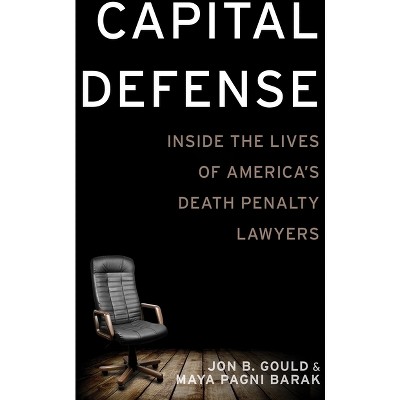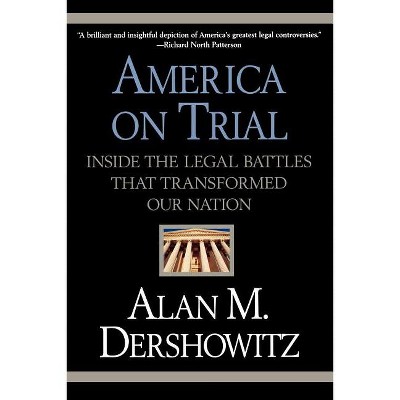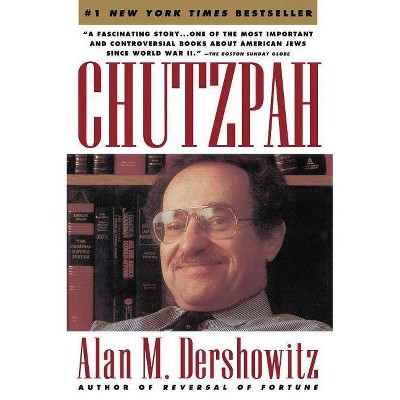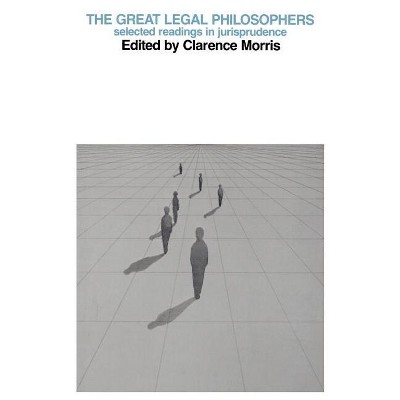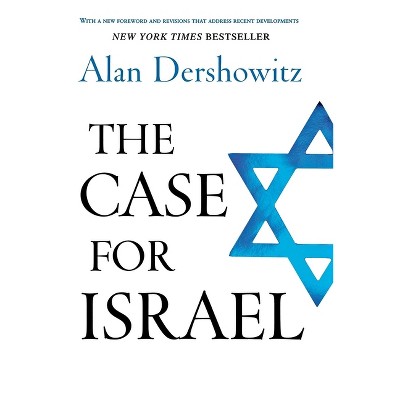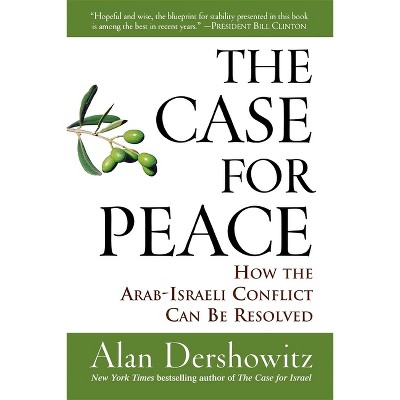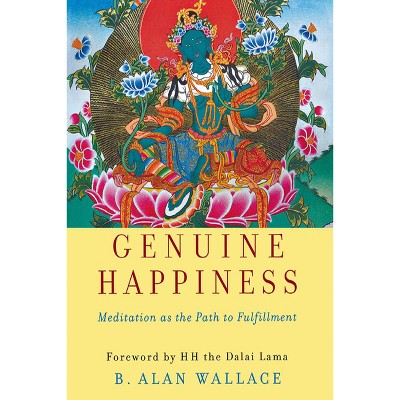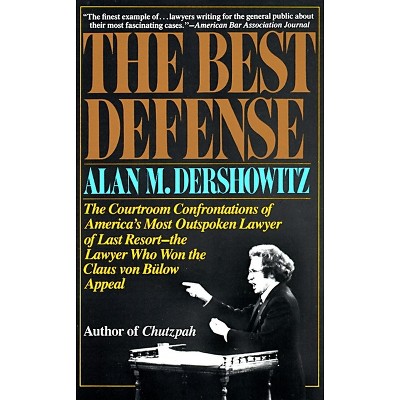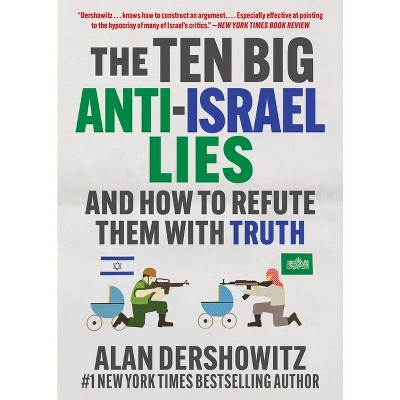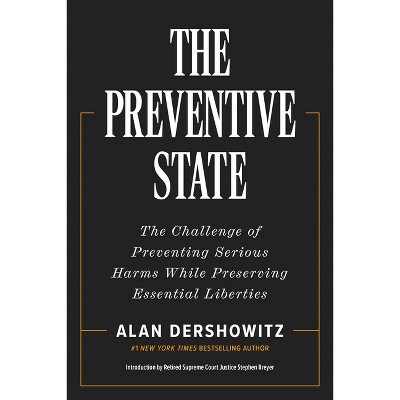Sponsored

The Case for Peace - by Alan Dershowitz (Hardcover)
In Stock
Sponsored
About this item
Highlights
- In The Case for Peace, Dershowitz identifies twelve geopolitical barriers to peace between Israel and Palestine-and explains how to move around them and push the process forward.
- About the Author: Alan Dershowitz, the Felix Frankfurter Professor of Law at Harvard Law School, is one of the country's foremost appellate lawyers and a distinguished defender of civil liberties.
- 256 Pages
- Political Science, Peace
Description
Book Synopsis
In The Case for Peace, Dershowitz identifies twelve geopolitical barriers to peace between Israel and Palestine-and explains how to move around them and push the process forward. From the division of Jerusalem and Israeli counterterrorism measures to the security fence and the Iranian nuclear threat, his analyses are clear-headed, well-argued, and sure to be controversial. According to Dershowitz, achieving a lasting peace will require more than tough-minded negotiations between Israelis and Palestinians. In academia, Europe, the UN, and the Arab world, Israel-bashing and anti-Semitism have reached new heights, despite the recent Israeli-Palestinian movement toward peace. Surveying this outpouring of vilification, Dershowitz deconstructs the smear tactics used by Israel-haters and shows how this kind of anti-Israel McCarthyism is aimed at scuttling any real chance of peace.From the Back Cover
Praise for The Case for Peace"Alan Dershowitz brings his exceptional skills as a legal and political thinker to this concise and compelling argument for Middle Eastern peace. The simple chord that resonates through the complex scenarios described in "The Case for Peace" is one of decency and respect - for Palestinians, for Israelis, and, ultimately, for humanity itself. With an eye toward shared benefits and lasting resolution, Dershowitz offers a pragmatic proposal rooted in the lessons of the past and the opportunities of the present. Hopeful and wise, the blueprint for stability presented in this book is among the best in recent years."
--President Bill Clinton
"Alan Dershowitz has been on the forefront of making the case for Israel and against terrorism. Now he turns his attention to making the case for peace. He understands, as I do, how difficult it is to achieve peace with security. He confronts these difficulties with insight and with the benefit of years of experience."
--Ariel Sharon
"Alan Dershowitz's "The Case For Peace" is a sober, pragmatic and yet enthusiastic voice for peace between Israel and Palestine, to be based not on sentimentalist wishful thinking and not on dogmatic theorizing but on realism and empathy. I read it with thrill."
--Amos Oz
"In The Case for Peace, Alan Dershowitz has offered a thoughtful and profoundly logical response to all the critical questions about what sustains the conflict between Israelis and Palestinians and what can end it. For anyone who believes in peace, even while having doubts about whether it can be achieved, this is an important book to read."
--Dennis Ross, former U.S. Envoy to the Middle East and author of "The Missing Peace: The Inside Story of the Fight for Middle East Peace"
"Alan Dershowitz has done it again! Just as he brilliantly presented The Case for Israel, he cogently argues that now is the time for peace between Israelis and Palestinians, with the passing of Yasser Arafat and the democratic election of Mahmoud Abbas. The Case for Peace, like The Case for Israel, takes aim at Israel's enemies, but Alan Dershowitz now recognizes that the enemies of peace, in the extremist camps of the Palestinians and Israel, are also enemies of an Israel that deserves to have peace within secure borders next to a Palestinian state. He properly takes special aim at those American academics who insist that only a one-state solution will provide justice for Palestinians, a certain prescription for the end of Israel as a Jewish state."
--Stuart Eizenstadt, former senior official in the Carter and Clinton administrations
Review Quotes
ALAN Dershowitz has a lovely vision of Middle East peace, imagining democratic Israel and a democratic Palestine prospering together.
Harvard Law's celebrity professor advocates a two-state solution, creating Palestine out of the territories Israel won in the 1967 war. Dershowitz believes two viable states with secure borders and stable political cultures can emerge from one of the world's most troubled pieces of real estate.
Invoking history, justice, reason and the rule of law, he analyzes the problems, seeking mutually agreeable solutions. Yet, sadly, rather than showing, as the hopeful subtitle suggests, "How the Arab-Israeli Conflict Can Be Resolved," this book makes a more convincing case that the conflict will continue.
Dershowitz once again proves in clear and readable prose that Israel is flexible, peace-seeking and ready to compromise, while offering little evidence that many Palestinian leaders are equally reasonable, courageous or committed to peace or democracy.
This short, punchy primer details just how virulent Palestinian rejectionism is--and has been for decades. Jewish and international compromises reach back to the Peel Commission in the 1930s, yet, again and again, Palestinians--and their cynical Arab allies--have preferred maximalist dreams to imperfect compromises.
Combining an appellate lawyer's precision with a courtroom showman's passion, Dershowitz examines how Yasser Arafat, among other destructive leaders, repeatedly turned Palestinians away from state-building, compromise and democracy, fostering an autocratic, demagogic, corrupt, delusional political culture addicted to terror.
Former Israeli Prime Minister Golda Meir famously lamented that Arabs must love their own children more than they hate Israel's children for peace to flourish; now, Palestinians must become more committed to building a "democratic Palestinian state living in peace with a democratic Israel" than to destroying Israel.
Convinced that a pragmatic Palestinian majority can emerge, Dershowitz lambastes the academics, church leaders, diplomats, reporters and so-called ""peace activists"" who feed Palestinians' delusions and sanction violence by demonizing Israel, no matter what it does.
Dershowitz and others advocating for a rational peace should challenge the West's armchair jihadists for rationalizing Palestinian terrorism, robbing Palestinians and Jews of hope. And it is noble for intellectuals defending Israel's legitimacy to dream of a possible compromise.
Dershowitz mischievously confounds critics by insisting that, while ardently pro-Israel, he remains liberal and "pro-Palestinian." But while occasionally mentioning a "peace process" and praising the Palestinian leader Mahmoud Abbas, Dershowitz fails to identify that Palestinian peace camp essential to creating a new, stable Middle East.
This book assumes that Israel disengaged from Gaza successfully. But Israel withdrew unilaterally because there was no credible negotiating partner, had to build a fence because Palestinian terrorists continue to target Israeli civilians and even uprooted Jewish gravesites because of justified fears that Hamas activists would desecrate the corpses.
Dershowitz's vision of peace will only work if Palestinians pass a simple test. Unless and until, Jews--and Jewish graves--can remain undisturbed on land ceded to the Palestinians, no peace is possible.
--Gil Troy, a professor of history at McGill University, is the author of Why I'm a Zionist. (The New York Post, August 28, 2005)
About the Author
Alan Dershowitz, the Felix Frankfurter Professor of Law at Harvard Law School, is one of the country's foremost appellate lawyers and a distinguished defender of civil liberties. His many books include the "New York Times" bestsellers "The Case for Israel" and "Chutzpah" as well as "The Vanishing American Jew," "Why Terrorism Works," and "America on Trial." He has been profiled and interviewed widely in the media and has written for the "New York Times," the "Wall Street Journal," the "Los Angeles Times," and many other newspapers and periodicals.www.wiley.com/go/dershowitz

